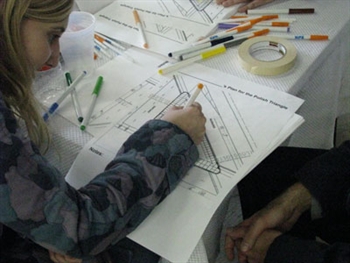More than 700 residents have participated in MPC’s Placemaking project to create a vision for the Polish Triangle, at the intersection of Milwaukee Avenue, Division Street, and Ashland Avenue.
There may be little to entice you to hang around the slab of concrete at the intersection of Division Street, Ashland Avenue, and Milwaukee Avenue today, but let your imagination roam and the space could be could be filled with people, kiosks, public art, and a bike station, or even transformed into a pedestrian plaza.
As part of its Placemaking Chicago initiative, MPC has partnered with WPB (the Special Service Area for Wicker Park and Bucktown neighborhoods) to transform this intersection, known as the Polish Triangle, into a well-used public place. In collaboration with Ald. Manny Flores (1st Ward) and Ald. Scott Waguespack (32nd Ward), and a steering committee that consists of city and neighborhood organizations, WPB and MPC are asking community members what they would like to see happen at this space.

In the first three months of the project, more than 700 people have contributed their insight and thoughts about the future of the Polish Triangle through an online survey, online network group, and open house. The open house, held over the weekend of March 21 and 22, featured activities such as large and small do-it-yourself plans of the triangle, a photo suggestion booth, and printed surveys. It also showcased a history of the neighborhood, examples of similar spaces from around the world, and plans for the triangle from neighborhood architects. Residents ideas include traffic calming measures on the streets surrounding the triangle, amenities such as bike racks, additional lighting and seating in the triangle, and more grass, flowers, or public art. ![]()
Check out more photos from the
Polish Triangle open house on MPC’s Flickr page.
Next up, MPC and WPB will continue to work with residents to form a vision for the Polish Triangle based on the ideas they’ve generated so far. This vision will include short-term changes that are relatively easy to implement, as well as long-term modifications. WPB and MPC also will plan events for the summer and fall to activate the space. Two possible ideas proposed by residents for this summer are a coffee cart and public events in the triangle. To stay informed about these events or provide input on the visioning of the space, please join the Polish Triangle online network group.
Special thanks to Joseph Freed and Associates, LLC, for generously donating the space for the open house, and to The Prince Charitable Trusts for sponsoring Placemaking Chicago.
For more information on the Polish Triangle project or MPC’s Placemaking initiative, please contact Karin Sommer at ksommer@metroplanning.org or 312-863-6044. Please visit www.placemakingchicago.com for Placemaking resources and inspiring stories about people making a difference in their communities.